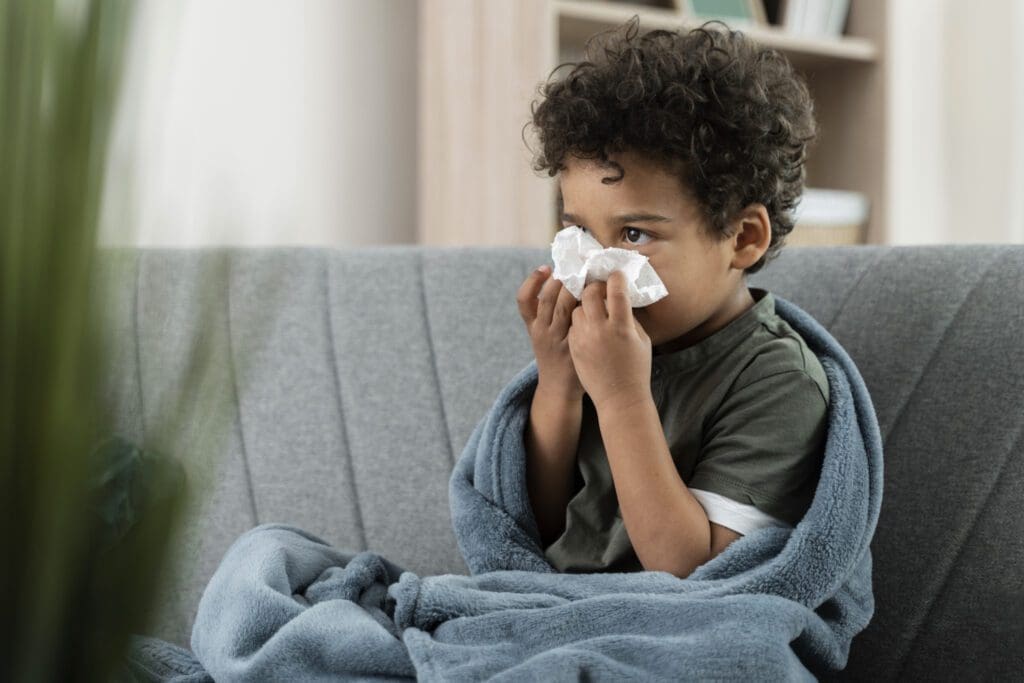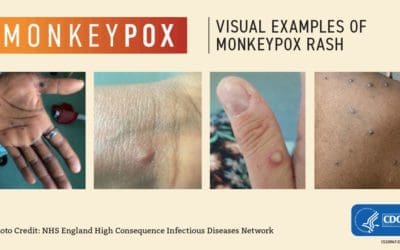Jackson County Public Health Investigates Rising Cases of Pertussis in Community

Pertussis, also known as whooping cough, has been circulating across the Kansas City region, including in Eastern Jackson County. While Jackson County Public Health (JCPH) has been notified of confirmed cases of pertussis, there have been no verified outbreaks in our community.
Even though cases remain relatively low, JCPH is urging local families to be on the lookout for signs of the illness.
“Although it can initially be mistaken for a cold, pertussis is a severe contagious respiratory illness known for causing coughing fits in older individuals and the hallmark ‘whoop’ sound in infants,” says Dr. Adeyemi Adedokun, Communicable Disease Coordinator. “It poses a great danger to infants under one year old.”
Last month, the Kansas City Health Department reported 75 cases within their jurisdiction. The majority of cases have been affecting unvaccinated children.
JCPH encourages parents of young children to take precautions, including receiving age-appropriate vaccines.
What You Need to Know
Symptoms of pertussis may include:
- Runny nose
- Mild cough that gradually gets worse
- Low-grade fever
- Coughing “fits” that can cause vomiting or gagging
- A whooping sound during coughing fits
- Inability to breathe (in infants and small children)
- A cough that lasts up to 10 weeks
Symptoms typically begin within seven to ten days after exposure. Pertussis spreads when an infected person coughs, sneezes, breathes, or talks, releasing droplets breathed in by those nearby. Those with mild symptoms may unknowingly pass the disease on to others.
Early antibiotic treatment is generally recommended, especially in infants and young children. The best protection against pertussis is vaccination (DTaP and Tdap), which many children receive in infancy and before starting school.
Certain populations are at higher risk for serious complications from pertussis, including:
- Infants younger than 12 months old
- Those in the third trimester of pregnancy
- Immunocompromised individuals
- Anyone with pre-existing health conditions that may be aggravated by pertussis infection, such as those with respiratory conditions like asthma or COPD
If you are exposed to pertussis and develop symptoms:
- Contact your medical provider, mention this advisory, and ask to be assessed and tested for pertussis.
- If your doctor believes you have pertussis, they will likely perform testing to confirm the diagnosis and prescribe a five-day course of antibiotics. Stay home from school, work, and all other activities until the full five days of antibiotic treatment have been completed.
After completing your full course of antibiotics, you may resume your normal activities, even if testing results are not back yet. - If your doctor believes you do not have pertussis, take general precautions to avoid making others ill.
JCPH is extending resources and support to those affected. Further information about pertussis can be found on the CDC’s website or by calling JCPH’s Communicable Disease Hotline at (816) 404-9898.
Archives
- December 2025 (1)
- November 2025 (2)
- September 2025 (1)
- July 2025 (2)
- June 2025 (3)
- April 2025 (2)
- February 2025 (1)
- January 2025 (2)
- December 2024 (1)
- September 2024 (2)
- August 2024 (2)
- July 2024 (1)
- June 2024 (1)
- February 2024 (1)
- July 2023 (1)
- March 2023 (1)
- October 2022 (1)
- September 2022 (1)
- August 2022 (1)
- July 2022 (2)
- June 2022 (2)
- May 2022 (1)
- April 2022 (4)
- March 2022 (1)
- February 2022 (1)
- January 2022 (1)
- December 2021 (4)
- November 2021 (3)
- September 2021 (2)
- August 2021 (3)
- July 2021 (2)
- June 2021 (1)
- May 2021 (2)
- March 2021 (1)
- December 2020 (6)
- November 2020 (8)
- October 2020 (4)
- September 2020 (7)
- August 2020 (3)
- July 2020 (11)
- May 2020 (2)
- April 2020 (4)
- March 2020 (1)
Categories
- Communicable Disease (5)
- Clinical Services (19)
- Clinical Servcies (1)
- Health Promotions (74)
- Emergency Preparedness (8)




